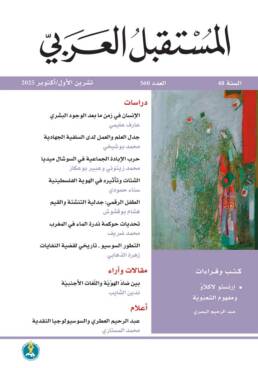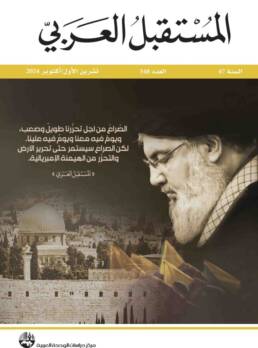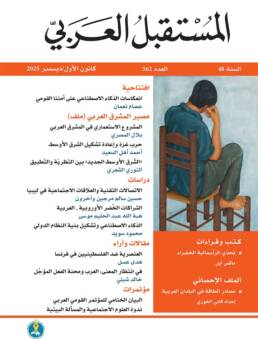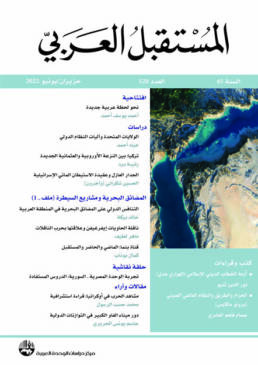⬛ Editorial
⬜ The Battle of Gaza: A Lesson to Be Learned Magdy Hammad 7
⬛ Studies
⬜ Political reasoning (Ijtihad) in Islamic Jurisprudence and Its
Reconciliation with the Modern State Mohammed Al-Aghzaf Ghouti 12
One of the most pressing trials facing contemporary Islamic thought is how to engage with Islamic heritage in the context of building the modern state. In addition to the complex task of reconciling classical jurisprudential texts with the practical demands of modern legal systems—particularly constitutional law. The significance and sensitivity of this issue lie in its deep connection to questions of state identity and legitimacy.
This study seeks to offer a contemporary reading of Islamic jurisprudential texts in an effort to evaluate their compatibility with the foundational principles of the modern state. The approach is grounded in a scientific methodology that examines the historical contexts and causes of juristic disagreements, while exploring potential frameworks for reconciliation. It does so without resorting to confrontational interpretations or neglecting the realities that shape legislation within the framework of the modern state.
Keywords: Constitution, Sharia, Modern State, Heritage, Consultation (Shura), Democracy.
⬜ A Critique of Lebanon’s Political Economy:
Ideology and Policy Najeeb Issa 30
This study offers a critical examination of Lebanon’s political economy through a historical review of the economic choices and visions that were adopted from independence till present. It traces the early formation of Lebanon’s foundational economic vision, rooted in pre-independence ideologies and later articulated by Michel Chiha. His theory, based on geographical and historical determinism, positioned Lebanon as a commercial and financial intermediary serving Western capitalist interests in the Arab East.
The study argues that two core pillars—sectarian politics and a brokerage-based economy—have shaped Lebanon’s economic model. These pillars, while functional for external economic roles, have deepened socio-economic disparities across regions and classes. Ultimately, they have contributed to Lebanon’s descent into a comprehensive systemic crisis.
Keywords: Free-market economy, Political sectarianism, Non-productive economy, Rentier economy, Michel Chiha.
⬜ The Clash of Grand Narratives: Disinformation Strategies and
Fabrication Contexts – The Gaza War as a Case Study Saïd Bouaita 45
Israel stands at the forefront of nations that emphasize the power of wartime narratives. Al-Aqsa Flood operation has revealed Israel’s strategic deployment of fabricated narratives, particularly its framing of the conflict as a war on terror. Central to this framing was the attempt to associate Hamas with ISIS, in a bid to sway global public opinion and build alliances in pursuit of a symbolic or illusory victory.
However, incidents such as the bombing of the Baptist Hospital and other documented events exposed the falsehood at the core of Israel’s overarching narrative. This unraveling of the evidence underpinning Israel’s justification has placed the international system in a profound legal and ethical dilemma. The global community has increasingly come to recognize that Israel’s actions aim not at self-defense, but rather at the forced displacement of Palestinians and the appropriation of their land.
Keywords: Grand narratives, War, Israel, Hamas, Gaza.
⬜ The State in the Maghreb and the Quest for a New Regional
Identity Hamid Belghit 60
This study seeks to address a central question: What drives Maghreb states—particularly those aspiring to regional leadership—to remain unsatisfied with their existing regional status, constantly searching for an alternative or trans-Maghreb regional identity?
To explore this, the study draws on constructivist theory to understand the distinct behavioral patterns of Maghreb states. The increasing complexity of regional politics in the Maghreb necessitates the application of theoretical approaches capable of offering nuanced, non-reductive interpretations—especially regarding the relationship between identity and interest, structure and agency, material and non-material factors, and the regional and international systems.
Keywords: Regional system, International system, Constructivism, Political system, Identity, Interest.
⬜ Ibn Rushd’s Rationalism in Light of Atef Al-Iraqi’s Critical
Approach Hicham Mabchour 78
This study explores how critical engagement with heritage can be undertaken without completely severing ties with it, and without fully reinstating it in contemporary times. Such a critical approach becomes necessarily selective—aimed at purging heritage of its irrational components and engaging with it partially, by retaining only what resonates with the challenges of the present.
This is particularly evident in the work of Egyptian philosopher Atef Al-Iraqi, who saw in Ibn Rushd the epitome of enlightened and rational thought—a thinker capable of offering tools and mechanisms to understand and interpret the modern age. Accordingly, the study is divided into two main sections: the first revisits the critical methodology of Ibn Rushd, while the second examines his approach to engaging with the intellectual legacy of the past.
Keywords: Critical thought, Enlightenment, Rational heritage, Ibn Rushd.
⬜ The Ṣadrist Theory of the State: Sources of Strength and
Weakness Bara’ Ali Deeb 93
The theory of Wilayat al-Faqih (Guardianship of the Jurist) represents a relatively late development in Shi‘a political thought and has become the most dominant political model among contemporary followers of the sect. Its emergence marked a significant departure from a long-standing tradition of political withdrawal that characterized Shi‘ism since the beginning of what is known—based on religious narrations—as the Occultation era (ghayba).
This study aims to identify the sources of strength and weakness in the Ṣadrist theory of the state. It does so by tracing the logical progression of Muhammad Baqir al-Ṣadr’s ideas regarding the historical origins of the state and the nature of its functions as he understood them. The second part of the study examines al-Ṣadr’s methodological approach, offering a critique of the foundational assumptions of the theory by engaging select tools of post-structuralist analysis.
Keywords: Political thought, Shi‘ism, Ṣadrist theory, Wilayat al-Faqih.
⬜ The Sociology of Collective Action: Toward a General Theory —
Protest Movements as a Case Study Abou Al-Qassem Ziyani
and Abdelaziz Safir 106
This paper explores the formation and persistence of collective action. It examines unemployed university graduates in Morocco as a case study of protest movements, using qualitative research methods including observation, in-depth interviews, and content analysis.
The study aims to construct a general theory of collective action that integrates multiple levels of analysis. It begins with the macro-political context in which such actions emerge, then moves to the meso level to investigate the role of organization and resource mobilization in sustaining these movements. Finally, it conducts a micro-level analysis of the rational logic and strategic behaviors of actors as they work to maintain group cohesion and achieve their goals.
Keywords: Collective action, protest movements, unemployed graduate groups, theoretical synthesis, levels of analysis.
⬜ The Arab Pharmaceutical Legacy: A Discursive–Epistemological
Intersection Fadi Klarji and Mohammed Hammadi 121
Pharmacy, along with the study and experimentation of drugs, was one of the scientific fields in which Arab scholars excelled during the medieval period. This study offers a cultural-historical reading of the pharmaceutical heritage accumulated by Arabs in that era. It seeks to analyze the scientific terminology related to medicine and to revive the dynamic nature of scientific inquiry, with particular emphasis on the unique contributions made by Arabs to this branch of medical science.
The aim of this initiative is to reinvest this historical scientific legacy into the early education of pharmacy students—enriching the cultural awareness of future generations of professionals, while also fostering a deeper recognition of their rich, yet often overlooked, heritage.
Keywords: Pharmacy, Heritage, Terminology, Culture, Arabs.
⬛ Articles & Opinions
⬜ Rebuilding Syria: Opportunities and Challenges Saad Al-Dalati 136
⬜ Artificial Intelligence and the Law Anas Al-Tawalbah 145
⬛ Books and Readings
⬜ The Power of the Image: Photography and the Marginalized History
of Palestine (Issam Nassar, Istfan Sheeha, and Salim Tamari)
Reviewed by Ahmad Ezzedine Asaad 152
⬜ Selected Arabic and Foreign Books
and Research Reports Gaby El-Khoury 160
Arabic Books: Lebanon’s Political Economy and the Obstruction of Development: The Dialectic of External Influence, Political Sectarianism, and a Non-Productive Economy; The Marginalized in the Arab Novel: The Egyptian Novel as a Model; The Jewish Community in Russia: From Marginalization to Influence; Endurance: The Factors Behind the Continued Vitality of the Palestinian Cause.
Foreign Books: The CIA Book Club: The Secret Mission to Win the Cold War with Forbidden Literature; Reframing Political Communication and Media Practices in the Middle East and North Africa; Original Sin: President Biden’s Decline, Its Cover-Up, and His Disastrous Choice to Run Again.
Research Reports: «Trump’s Mistaken Belief That What Happens Elsewhere Isn’t Washington’s Concern»; «What the End of the Houthi Campaign Means for US Power».
Add a review
You must be logged in to post a review.








